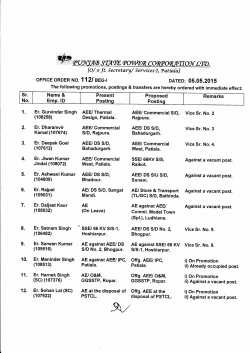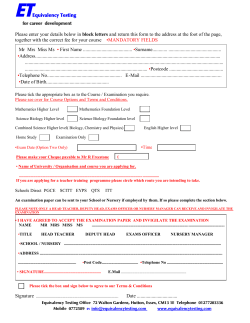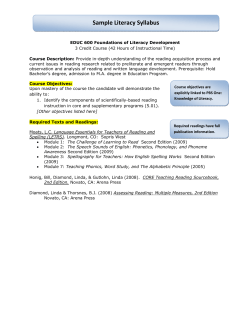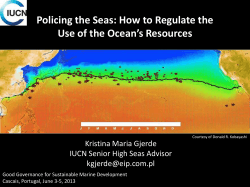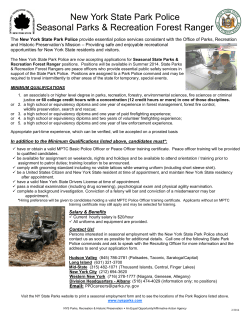
YEAR 12 SAMPLE QUESTIONS Alternative Education Equivalency Scheme (AEES) ENGLISH
YEAR 12 SAMPLE QUESTIONS Alternative Education Equivalency Scheme (AEES) ENGLISH The following sample items exemplify the kinds of items in the test, but do not necessarily indicate the full range of items or test difficulty. English Comprehension Some questions in the multiple-choice test are based on passages or pieces of writing and you will be required to answer questions on recognising the meaning of words, identifying details of content, sequencing events in logical order, making inferences, and so on. See the Answer Key for answers to these sample questions. Read the following and then answer example questions 1 and 2. At that moment the cab screamed to a halt outside a doorway with “Pension Suisse (Hotel)” above it. The dogs on the street, feeling that they were at last going to get to grips with the privileged black canine who rode in cabs, surrounded us in a solid, panting barrier. The door of the hotel opened and an ancient porter appeared and stood staring glassily at the turmoil in the street. The difficulties of getting Roger, the privileged black canine out of the cab and into the hotel were considerable, for he was a heavy dog, and it took the combined efforts of the family to lift, carry and restrain him. The driver, who had by now forgotten his majestic pose, leapt down and danced about the pavement with a whip, clearing a path through the dogs. The family and I hurried behind, bearing the struggling, snarling Roger. As we staggered into the hall, the porter slammed the front door and leant against it, his moustache quivering. The manager came forward, eyeing us with a mixture of appreciation and curiosity. Mother faced him, smiling sweetly, as though our arrival had been the most normal thing in the world. “Our name’s Durrell. I believe you’ve got some rooms booked for us?” Adapted from ““My Family and Other Animals” by Gerald Durrell” Example 1 The tone of this passage is … A. taunting. B. dramatic. C. persuasive. D. sarcastic. Example 2 Who cleared a path for Roger to enter the hotel? A. the cab driver B. the dogs on the street C. the hotel porter D. the hotel manager Example 3 Which option best explains the dogs wanting to “get to grips” with Roger? They wanted to… A. share a meal with him. B. make his acquaintance. C. carry him into the hotel. D. deal with this intruder. Example 4 Roger was struggling and snarling because he… A. did not want to stay at that particular hotel. B. wanted to fight the dogs surrounding him. C. was afraid of being whipped. D. preferred to stay safely in the cab. Example 5 The manager experienced mixed feelings because… A. the porter’s moustache was quivering. B. the Durrell family were staggering into the hall. C. he was met with a strange sight. D. the porter had slammed the door. Example 6 In which sentence is the colon (:) used correctly? A. On my list for the marketplace was: herbs, fruits and perfumes. B. The bus was filled with: joking, laughing and jostling passengers. C. Helen chose to open: the store and dust the furniture. D. My birthday party was: noisy, jovial and unforgettable. Example 7 Which word would be the best substitute for the underlined word? Studies are being conducted to validate claims that from taking vitamins on a daily basis can promote better health and wellbeing. A. refute B. research C. substantiate D. applaud Page 2 of 24 Alternative Education Equivalency (AEE) Assessments Year 12 Sample Questions Example 8 In which word is the ‘ph’ not pronounced ‘f’? A. photogenic B. haphazardly C. philosophy D. alphabetically Example 9 Which word is incorrectly spelt? A. believe B. niece C. deceit D. counterfeit Example 10 Which sentence contains a grammatical error? A. We will be leaving when they are all ready. B. I told him it was all ready too late to register. C. The football players were already waiting to play. D. The sequel was already in the cinemas. Example 11 Which word would be the best substitute for the underlined word? The crowd was anxious and excited and many fans had travelled a long distance just to spectate. This game was paramount to both clubs and you could feel the tension of anticipation. A. imminent B personal C. critical D. necessary Example 12 Which of the following words cannot use the prefix “mis...”? A. claim B. adventure C. interpret D. pronounce Page 3 of 24 Alternative Education Equivalency (AEE) Assessments Year 12 Sample Questions Example 13 In which sentence is the apostrophe (‘) used correctly? A. You’re adventures took me to exotic places. B. We’re enjoying the hot summer weather. C. The garden’s were blooming prolifically. D. Ours’ was a long journey over many lands. Example 14 In which sentence are commas (,) used correctly? A. The mayor an old friend, of the family’s, was re-elected for another term. B. After a long time in transit, we were relieved, to finally arrive at the house and enjoy a rest. C. Whenever I remember Italy, I think of the architecture, the pasta, and all the gelati! D. Walking through the streets in the rain, our hats, jumpers and coats became saturated. Example 15 Combine the following three sentences into a single sentence. He was waiting for me at the station. We were going directly to the restaurant. We were meeting friends for dinner. A. He was waiting for me at the station because we were going directly to the restaurant where we were meeting friends for dinner. B. He was waiting for me at the station and we were going directly to the restaurant so we were meeting friends for dinner. C. He was waiting for me at the station when we were going directly to the restaurant as we were meeting friends for dinner. D. He was waiting for me at the station when we were going directly to the restaurant but we were meeting friends for dinner. Page 4 of 24 Alternative Education Equivalency (AEE) Assessments Year 12 Sample Questions GENERAL MATHEMATICS The following examples will give you an indication of the type and format of questions, but not necessarily indicate the full range of items or test difficulty. For the General Mathematics test, you may use a silent, battery-operated, non-programmable scientific calculator. See the Answer Key for answers to these sample questions Formulae The following formulae may be used in your calculations: Area and volume • Area of rectangle = length x width • Area of triangle = ½ base x height • Volume of a prism = area of base x height Theorem of Pythagoras • In any right-angled triangle: c2 = a2 + b2 c b a Temperature conversion formula Degrees Celsius to degrees Fahrenheit: • ºF = (ºC x 1.8) + 32 Trigonometry Hypotenuse Opposite side θ Adjacent side Page 5 of 24 Alternative Education Equivalency (AEE) Assessments Year 12 Sample Questions In any right-angled triangle: Growth and decay formulae • Simple growth or decay: A = P(1± ni) • Compound growth or decay: A = P(1± i)n Where: A = amount at the end of n years P = principal n = number of years i = interest rate per year, r% = i t • Compound interest, where the interest is compounded t times per year: A P(1 ) nt Where: t number of interest periods per year • Future value of an annuity: F OR F x[(1 i )n 1] (1 i ) i x[(1 i )n 1] Contributions at end of each period i Contributions at beginning of each period Where: F = future value of annuity i = interest rate per compounding period, as a decimal fraction n = number of compounding periods Page 6 of 24 Alternative Education Equivalency (AEE) Assessments Year 12 Sample Questions Other • For constant acceleration, distance covered: d 1 2 at 2 Where: d = distance a = acceleration t = time • Loudness of sound: D log 10 I I0 Where: D = the loudness of sound in dB (decibels) I = the intensity of a sound expressed as a power of 10, watts per cm2 I0 = 10-16 is the lowest sound intensity audible by the human ear. • Richter Magnitude of an earthquake: M log10 A 3 log10 8t 2.92 Where: M = magnitude of earthquake A = the amplitude, in millimetres, measured from the paper record of the seismometer Δt = the distance of the seismometer from the earthquake, estimated by the time difference in seconds Page 7 of 24 Alternative Education Equivalency (AEE) Assessments Year 12 Sample Questions Number Example 1 3 1 9 4 3 A. 117 B. 3 C. 1 D. 10 E. 9 3 4 5 6 1 12 3 4 2 2 2 Example 2 A. 2 B. 2 C. 4 D. 4 E. 6 Example 3 2.329 x 1.0421 rounded to 2 decimal places is: A. 2.41 B. 2.42 C. 2.43 D. 2.427 E. 3.309 Example 4 Rob is planning to buy a television. If the current price is $5,000 and the inflation rate is 6% p.a. how much will he have paid in 3 year’s? A. $5,896.35 B. $5,900.00 C. $5,955.08 D. $6,500.00 E. $6,566.65 Page 8 of 24 Alternative Education Equivalency (AEE) Assessments Year 12 Sample Questions Example 5 Agnes invested $5,000 at an interest rate of 9% p.a. compounded monthly. How long will it take for the investment to double in value? A. 5 years 9 months B. 7 years 9 months C. 9 years 5 months D. 9 years 7 months E. 9 years 8 months Space Example 6 A window cleaner has an 8 m long ladder. If the maximum safe angle for a ladder to the ground is 70°, the maximum safe height the ladder can reach up a wall is: A. 2.74 m B. 7.00 m C. 7.52 m D. 7.75 m E. 22.0 m Example 7 A bushwalker walks 5 km north, then 3.5 km west then 2.75 km south. What would be the distance, and compass reading, of the walker's final position from their starting point? A. 4.16 km, 302.7° B. 4.16 km, 32.7° C. 4.16 km, 57.3° D. 5.75 km, 302.7° E. 5.75 km, 32.7° Measurement Example 8 Which of the following scales would be the most appropriate to use for drawing the plan of a house? A. 1 : 10 B. 1 : 100 C. 1 : 1 000 D. 1 : 10 000 E. 1 : 100 000 Page 9 of 24 Alternative Education Equivalency (AEE) Assessments Year 12 Sample Questions Example 9 A lead ball is dropped from a building. If the rate of acceleration is 10m/s2, then what distance will the ball have travelled after 5 seconds? For the purpose of this question, assume there is no air resistance. A. 150 m B. 125 m C. 100 m D. 75 m E. 50 m Chance & Data Example 10 Page 10 of 24 If three coins are tossed, what is the chance of three heads occurring? A. 1 2 B. 1 4 C. 1 6 D. 1 8 E. 1 16 Alternative Education Equivalency (AEE) Assessments Year 12 Sample Questions Example 11 The distribution of employee salaries in an organisation is shown below. Which of the following correctly list the mean (M) and mode (MO) of this data? A. M=35; MO=39 B. M=39; MO=55 C. M=43; MO=35 D. M=55; MO=35 E. M=55; MO=39 Algebra Example 12 If x 20 and y 8 then 2x ? 5y A. 0.16 B. 1 C. 2.5 D. 48 E. 160 Page 11 of 24 Alternative Education Equivalency (AEE) Assessments Year 12 Sample Questions Example 13 The surface area of a sphere is given by A 4 r 2 and the circumference of a circle is given by C d . If the surface area of a planet is approximately 5.101 x 108 km, what is the circumference of this planet? A. 6,371.2 km B. 12,742.4 km C. 4.059 x 107 km D. 40,031.57 km E. 7,926.41 km Example 14 Peter wants to build an A-frame house (isosceles triangle). Referring to the following diagrams, if BD = x metres and AD = 10 – x metres, determine the dimensions needed to maximise the cross-sectional area of the house as shown. A. BC = 5 m; AD = 5 m B. BC = 5 m; AD = 7.5 m C. BC = 10 m; AD = 5 m D. BC = 7 m; AD = 3 m E. BC = 14 m; AD = 4 m ADVANCED MATHEMATICS Please refer to the ‘Year 12 Advanced Mathematics Candidate Preparation Kit Supplement for the Year 12 Advanced Mathematics sample questions. Page 12 of 24 Alternative Education Equivalency (AEE) Assessments Year 12 Sample Questions SCIENCE The following sample items show the types of items in the test, but do not necessarily indicate the full range of items or test difficulty. For the Science test, you may use a silent, battery-operated, non-programmable scientific calculator See the Answer Key for answers to these sample questions. Read the following information about ‘genetic inheritance’ and answer example questions 1 - 3. In genetic inheritance some characteristics, or 'traits', are controlled by a single pair of genes. Generally in these situations one gene is dominant over the other. The 'dominant' gene is written with a capital letter and the other version of the gene, called the 'recessive' gene, is written with a lower case letter. In sexual reproduction, one half of each parent's genes is randomly combined with half of the other parent's genes to create the offspring. Suppose the height of a certain type of pea plant is controlled by a gene where the tall version, 'T', is dominant over the short version, 't'. Plants with the combinations 'TT', 'Tt' or 'tT' will be tall because 'T' dominates over 't'. Only plants with the combination 'tt' will be short. Example 1 Two tall pea plants with the height gene combination 'Tt' sexually reproduce to create the next generation of pea plants. What will be the most likely ratio of tall to short plants in this next generation? A. 3:1 B., 2:1 C. 1:2 D. 1:3 E. all plants will be tall Example 2 One tall and one short plant sexually reproduce to form a new generation of pea plants. Half this resulting generation is tall and the other half is short. What is the most likely genetic combination of the parent plants height gene? A. TT; tt B. Tt; Tt C. Tt; tt D. tt; tt E. TT; TT Page 13 of 24 Alternative Education Equivalency (AEE) Assessments Year 12 Sample Questions Example 3 Suppose that a different gene, B, controls leaf shape, where 'B' is dominant and produces broad leaf plants and 'b' narrow leaf ones. Also suppose that the combination 'BB' is fatal, meaning only plants with the gene combinations 'Bb' or 'bb' can grow and reproduce. If two broad leaf plants sexually reproduce, what proportion of narrow leafed plants would there be in the next generation? A. None B. one half C. one third D. one quarter E. all will be narrow leafed Read the following information about ‘projectile motion’ and answer example questions 4 – 7. A ball is rolling along a flat surface at 3 metres per second when it rolls off a ledge. The ball hits the ground 4 seconds later. The path of this ball after it rolls off the ledge can be calculated using the following formula: y gx 2 2u 2 Where: u = initial horizontal velocity (m/s) g = acceleration due to gravity (10 m/s2) x = horizontal displacement (m) y = vertical displacement (m) Note: air resistance is assumed to be negligible for the purposes of the following questions. Sample questions continued on the next page Page 14 of 24 Alternative Education Equivalency (AEE) Assessments Year 12 Sample Questions Example 4 Which of the following graphs correctly shows the horizontal velocity of the ball in metres per second (m/s) versus time in seconds, for the first 3 seconds after the ball falls off the ledge? A B C D E Page 15 of 24 Alternative Education Equivalency (AEE) Assessments Year 12 Sample Questions Example 5 Which of the following graphs correctly shows the vertical velocity of the ball in metres per second (m/s) versus time in seconds, for the first 3 after the ball falls off the ledge? A B C D E Page 16 of 24 Alternative Education Equivalency (AEE) Assessments Year 12 Sample Questions Example 6 Which of the following graphs correctly shows the vertical acceleration of the ball (in m/s2) versus time (in seconds) for the first 3 seconds after the ball falls off the ledge? A B C D E Page 17 of 24 Alternative Education Equivalency (AEE) Assessments Year 12 Sample Questions Example 7 Which of the following graphs correctly shows the horizontal displacement of the ball from the ledge in metres (m) versus time in seconds, for the first 3 seconds after the ball falls off the ledge? A B C D E Page 18 of 24 Alternative Education Equivalency (AEE) Assessments Year 12 Sample Questions Read the following information about ‘electrical power transmission’ and answer example questions 8 - 10. The following formulae may be useful when answering questions in this topic: P=VxI V = I x R (= Ohm's Law) P = I2 x R Where: V = voltage (or EMF), in Volts I = current, in Amperes R = resistance, in Ohms P = power, in Watts It is a basic premise of electrical power transmission that there is an inverse relationship between voltage and current. This is described by the formula P = V x I. For example, to supply 1,200 Watts (W) at 240 Volts (V), a current of 5 Amperes (A) is needed. However to supply 1,200 W at 24,000 V a current of only 0.05 A is needed. This has implications for the transmission of electrical power to towns and cities. If electrical power was carried at 240 V from the major generators to users, large currents and cable sizes would be required. This would be very expensive and would also cause large power losses in the cables on the way. This power loss is mostly due to heating of the cables and can be calculated using the formula P = I2 x R. To overcome these problems, power distributors reduce the current needed by increasing the voltage when feeding the power into transmission systems and reduce the voltage when feeding power into the street distribution systems that supply users. Example 8 33 MW of power is being supplied via a transmission line to a town at 300 kV, where it will be reduced to meet the voltage requirements of users. What current is being carried in this transmission line? A. 0.01 A B. 0.11 A C. 9.1 A D. 110 A E. 110,000 A Page 19 of 24 Alternative Education Equivalency (AEE) Assessments Year 12 Sample Questions Example 9 How much power is being lost from a transmission line with a resistance of 4.4 ohm when it is carrying a current of 25 A? A. 0.18 W B. 5.70 W C. 110 W D. 2,750 W E. 110,000 W Example 10 Step-up transformers transform an input voltage to a higher output voltage. A stepup transformer with a ratio of 1:4 has an input voltage of 11 kV. What is the output voltage of this transformer? A. 2.75 kV B. 11 kV C. 22 kV D. 44 kV E. 55 kV Read the following information about ‘chemical equations’ and answer example questions 11 and 12. Chemical equations describe the process of chemical reactions. For instance, if you add a solution of silver nitrate (AgNO3) to a solution of magnesium chloride (MgCl2), a reaction will occur and magnesium nitrate (MgNO3) and silver chloride (AgCl) will form. The chemical equation for this reaction is: 2AgNO3 + MgCl2 → 2AgCl + MgNO3 In this formula: • The chemicals on the left hand side of the arrow are called 'reactants'. • The chemicals on the right hand side of the arrow are called 'products'. During a chemical reaction, atoms are neither created nor destroyed. Therefore the total number of each element must be the same on both sides of the equation. For example, there are two Ag (silver) atoms on the left hand side, so there must be two Ag atoms accounted for on the right hand side. Page 20 of 24 Alternative Education Equivalency (AEE) Assessments Year 12 Sample Questions Example 11 The equation for photosynthesis is below. For this chemical equation, what will 'x' and 'y' be? 6CO2 + 6H2O → CxHyO6 + 6O2 A. x = 6 and y = 12 B. x = 6 and y = 6 C. x = 12 and y = 12 D. x = 12 and y = 6 E. x = 2 and y = 6 Example 12 Which of the following chemical equations is correctly balanced? A. H2 + O2 → H2O B. CuCl2 + AgNO3 → 2AgCl + Cu(NO3)2 C. C3H8 + O2 → 3CO2 + 4H2O D. CO + O2 → CO2 E. Cu + 2AgNO3 →2Ag + Cu(NO3)2 Read the following information about ‘equilibrium’ and answer example question 13. Many chemical reactions are reversible. This means that the reaction can go in either a forward (→) or a backward (←) direction. The example shown below is a reversible reaction. To show this, the arrow between the reactants and products has a double ended arrow. A+B↔C+D A state of equilibrium is reached when the forward and backward chemical reactions proceed at the same rate. However there will be no visible change taking place once equilibrium is reached. Page 21 of 24 Alternative Education Equivalency (AEE) Assessments Year 12 Sample Questions In a reversible reaction, the ratio of concentrations of products to reactants is a constant called the ‘equilibrium constant’. This is given the symbol K. For the general reaction aA + bB ↔ cC + dD, K is calculated by substituting the concentrations of each substance according to this general formula: K [C ]c [ D]d [ A]a [ B]b Where: the brackets [ ] mean concentration, and a, b, c and d relate to the ratio of each of A, B, C and D in the equation. Example 13 The chemical equation below describes a reversible reaction. H2 + I2 ↔ 2HI Where the concentration of H2 = 0.1433 x 10-2 mol/dm3 I2 = 0.1433 x 10-2 mol/dm3 HI =0.9999 x 10-2 mol/dm3 The equilibrium constant for this reaction is: A. 0.00487 B. 0.1433 C. 14.33 D. 48.67 E. 486,878.7 Page 22 of 24 Alternative Education Equivalency (AEE) Assessments Year 12 Sample Questions Year 12 Sample Questions Answer Key Subject Question Answer Question Answer English Question 1 B Question 9 D Question 2 A Question 10 D Question 3 D Question 11 C Question 4 B Question 12 A Question 5 C Question 13 B Question 6 A Question 14 D Question 7 C Question 7 A Question 8 B Question 1 B Question 8 B Question 2 B Question 9 B Question 3 C Question 10 D Question 4 C Question 11 C Question 5 B Question 12 B Question 6 C Question 13 D Question 7 A Question 14 C Question 1 A Question 8 D Question 2 C Question 9 D Question 3 C Question 10 D Question 4 B Question 11 A Question 5 C Question 12 E Question 6 D Question 13 D Question 7 E General Mathematics Science Please refer to the ‘Year 12 Advanced Mathematics Candidate Preparation Kit Supplement for the answers to the 12 Advanced Mathematics sample questions. Page 23 of 24 Alternative Education Equivalency (AEE) Assessments Year 12 Sample Questions Notes ………………………………………………………………………………………………………………… ………………………………………………………………………………………………………………… ………………………………………………………………………………………………………………… ………………………………………………………………………………………………………………… ………………………………………………………………………………………………………………… ………………………………………………………………………………………………………………… ………………………………………………………………………………………………………………… ………………………………………………………………………………………………………………… ………………………………………………………………………………………………………………… ………………………………………………………………………………………………………………… ………………………………………………………………………………………………………………… ………………………………………………………………………………………………………………… Level 5, 478 Albert Street East Melbourne 3002 Victoria Australia TEL +61 3 9655 4801 FAX+ 61 3 9654 3385 vetassess@vetassess.com.au All rights reserved. No part of this test may be reproduced without written permission from VETASSESS. 18-8-2014 Page 24 of 24 Alternative Education Equivalency (AEE) Assessments Year 12 Sample Questions
© Copyright 2025

